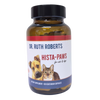If your dog or cat suffers from a sensitive stomach or chronic gastrointestinal (GI) upset, you know how frustrating it can be. Not knowing the root cause of your pet’s digestive issues only adds to the challenge. After trying various foods and medications, you might feel like you're running out of options. But take heart—there is a solution! It may take time and patience, but with the right approach, even the toughest GI cases can be managed. By working closely with your veterinarian and focusing on pet gut health, you can support healing with a few simple steps.
Isolate and Eliminate the Culprit
Once your veterinarian rules out any underlying illness, the next step is to take a closer look at your pet’s diet. Many digestive issues in pets stem from food sensitivities or allergies. One of the reasons we recommend The CrockPET Diet is that it allows you to completely personalize your pet’s meals, making it easier to pinpoint potential triggers.
For instance, if your dog has itchy skin and an upset stomach from poultry, you can switch to a cooling protein like turkey, without losing the convenience of a diet they enjoy. You can even swap in ingredients like sweet potatoes or squash, ensuring the perfect balance for your dog. Additionally, by controlling exactly what goes into their food, you can easily avoid problem foods that aggravate their gut.
A useful method for this is to simplify their meals: use just one protein, one vegetable, one brassica (like broccoli), and a starch. Then, gradually change only one ingredient per batch. This careful approach can help you identify which foods are causing GI distress. Once you find a combination that works, stick with it for a few weeks to allow your pet’s gut to heal. As their digestive system strengthens, you may be able to introduce more variety—slowly!
Probiotics: A Key to Gut Health
When it comes to improving pet gut health, probiotics for dogs and probiotics for cats are essential. These beneficial bacteria help restore balance in the digestive system, fighting off harmful bacteria and supporting overall health. By incorporating a high-quality dog gut health supplement or probiotic, you can address both immediate symptoms and long-term gut health.
Probiotics are particularly helpful in managing chronic GI inflammation, which can lead to more serious health issues if left untreated. They are the first line of defense in promoting healthy digestion and can even improve your pet’s immune system. In other words, probiotics for dogs and probiotics for cats don’t just help with digestive issues—they contribute to overall well-being. For many pets, probiotics are one of the best gut healing supplements available.
Fiber: Fuel for Gut Health
For probiotics to work at their best, they need proper nourishment, and that’s where fiber comes in. Digestible fiber helps feed the good bacteria, allowing them to thrive. The best leaky gut supplements often incorporate fiber-rich ingredients, such as barley, peas, apples, or citrus. These foods are not only beneficial for gut health but also make healthy, fiber-rich treats for your pet.
If you’re looking for a convenient way to add more fiber, consider using psyllium husk. It can be easily mixed into your pet’s food, providing a natural and effective boost to their digestive system. However, be cautious with high-fiber foods like beans, which can sometimes cause gas or other GI symptoms. Each pet’s gut health needs are unique, so observe how they respond and adjust accordingly.
Mushrooms Supplements for Gut Health
In addition to probiotics and fiber, there are other dog gut health supplements that can support your pet’s recovery. Mushroom supplements for gut health are becoming increasingly popular due to their ability to boost immunity and support the gut’s natural healing process. Certain mushrooms, such as reishi, shiitake, and maitake, are rich in antioxidants and beta-glucans, compounds known for their positive effects on gut health. Incorporating these mushroom supplements into your pet’s diet can be a powerful way to promote healing and prevent future issues.
If your pet is struggling with leaky gut, which is common in pets with chronic GI issues, the best leaky gut supplements can make a difference. These supplements typically contain a combination of probiotics, digestive enzymes, and herbs that support the repair of the intestinal lining, preventing further irritation and inflammation.
Be Patient and Persistent
The road to healing your pet’s gut may take time. Whenever you’re introducing changes to their diet or adding new supplements, such as gut healing supplements, always do so gradually and with patience. It’s also important to remember that cats can be more resistant to change than dogs, so they may require extra time to adjust.
Healing from GI issues is a process, but the sooner you start focusing on your pet’s gut health, the easier it will be to manage their overall well-being in the future. Their health truly starts in the bowl, and your pet deserves the best.
Additional Resources
For more in-depth guidance on improving your pet's gut health, explore these valuable resources:
- The Comprehensive Gut Instincts: Natural Digestion & GI Health for Dogs and Cats – A complete course on supporting natural digestion and GI health in pets, offering tools to manage gut issues holistically.
- The Crockpet Health Bundle: Recipe + Kidney & Gut Health Course – A comprehensive package that includes personalized recipes and expert guidance on improving kidney and gut health for your pets.
- Gut Health Starter Kit Course for Dogs and Cats – Perfect for beginners, this kit offers everything you need to kickstart better gut health for your dog or cat.
You can also watch our Facebook Live or Join Our Community, where we discuss managing GI health in dogs and cats. As always, consult with your veterinarian before making any major dietary changes or adding new supplements. Keeping them informed ensures your pet gets the best care possible.
















